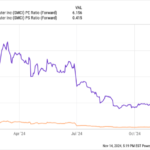The first quarter of 2024 is drawing to a close. Within 45 days, money managers with more than $100 million in assets under management (AUM) will be required to file their 13F forms with the SEC disclosing their portfolio holdings. As a result, hedge fund investors are noticing some big buys and sells.
Assessing Market Trends Through Hedge Fund Activities
The filings give investors a granular look at where the smart money was placing its bets. Despite the dated information, you still get insight into the stocks hedge funds are buying and selling. You can see the trends they feel are coming into style or falling out of favor.
While blindly following their lead without personal due diligence is not recommended, leveraging their insights can potentially offer benefits. Many times, one can secure a better stock price compared to theirs or maximize profits when they exit early.
Reviewing the moves made by billionaire money managers in the last quarter reveals surprising trends with stocks being heavily sold off or accumulated by these financial elites.
Microsoft (MSFT): A Tale of Contrasting Positions
There were almost 60% more sellers than buyers of Microsoft (NASDAQ:MSFT). Noteworthy figures like Jim Simons at Renaissance Technologies completely divested his holdings, while Steven Cohen of Point72 Asset Management offloaded over three-quarters of his stake in the tech giant.
Despite the selloff, Microsoft garnered attention for integrating artificial intelligence (AI) into its products, alongside impressive fiscal second-quarter earnings. With MSFT stock trading near its all-time high and showing a 12% increase this year, shareholders enjoyed a 52% rise from the previous year’s standing.
Microsoft’s emphasis on AI, especially through its integration of OpenAI’s ChatGPT chatbot, bolstered Azure cloud computing’s growth by 600 basis points in the last quarter. The company’s hybrid cloud services further solidify its market position, set to accelerate AI’s contribution to future growth.
The decision to reduce or eliminate MSFT holdings raises questions, as Microsoft typically presents a secure investment option. Monitoring hedge fund movements may provide additional insights for cautious investors.
Alphabet (GOOG): A Shift in Fortune?
Alphabet (NASDAQ:GOOG) witnessed hedge funds shedding shares in the previous quarter. While some like Jim Simons redirected funds from Microsoft to Alphabet, investors such as Paul Tudor Jones and the Bill & Melinda Gates Foundation completely divested their positions. Even Bill Gates swiftly exited his minimal 14,000 shares.
Despite the sell-off, Alphabet remains close to its all-time high attained in January. The company’s dominance in the search engine market and substantial cash flows maintain its market position, despite recent setbacks with AI integration in Gemini.
While challenges persist, Alphabet’s diverse ventures and robust financial standing, including Apple’s adoption of its AI technology, suggest a premature sell-off. Counterintuitively, imitating significant hedge funds’ actions might not always lead to optimal outcomes.
Target (TGT): The Rising Star
Target (NYSE:TGT) emerged as a target for accumulating funds among money managers, with prominent investors like Joel Greenblatt increasing their holdings by 37% and Tom Gaynor at Markel raising stakes by 46%. Despite a challenging year for the retailer, its discounted valuation appealed to hedge funds.
Target’s robust third-quarter earnings signified business recovery, driving TGT stock up by 77% from its 52-week low hit before the financial report. Additionally, recent Q4 earnings underline the company’s performance, though competitive pressures persist from online and physical retail competitors.
Despite its recent stock price surge, Target remains attractively priced, trading at a fraction of sales and 16 times next year’s earnings. Projected long-term earnings growth further underscores the viability of Target stock, warranting a closer examination beyond the actions of giant hedge funds.




